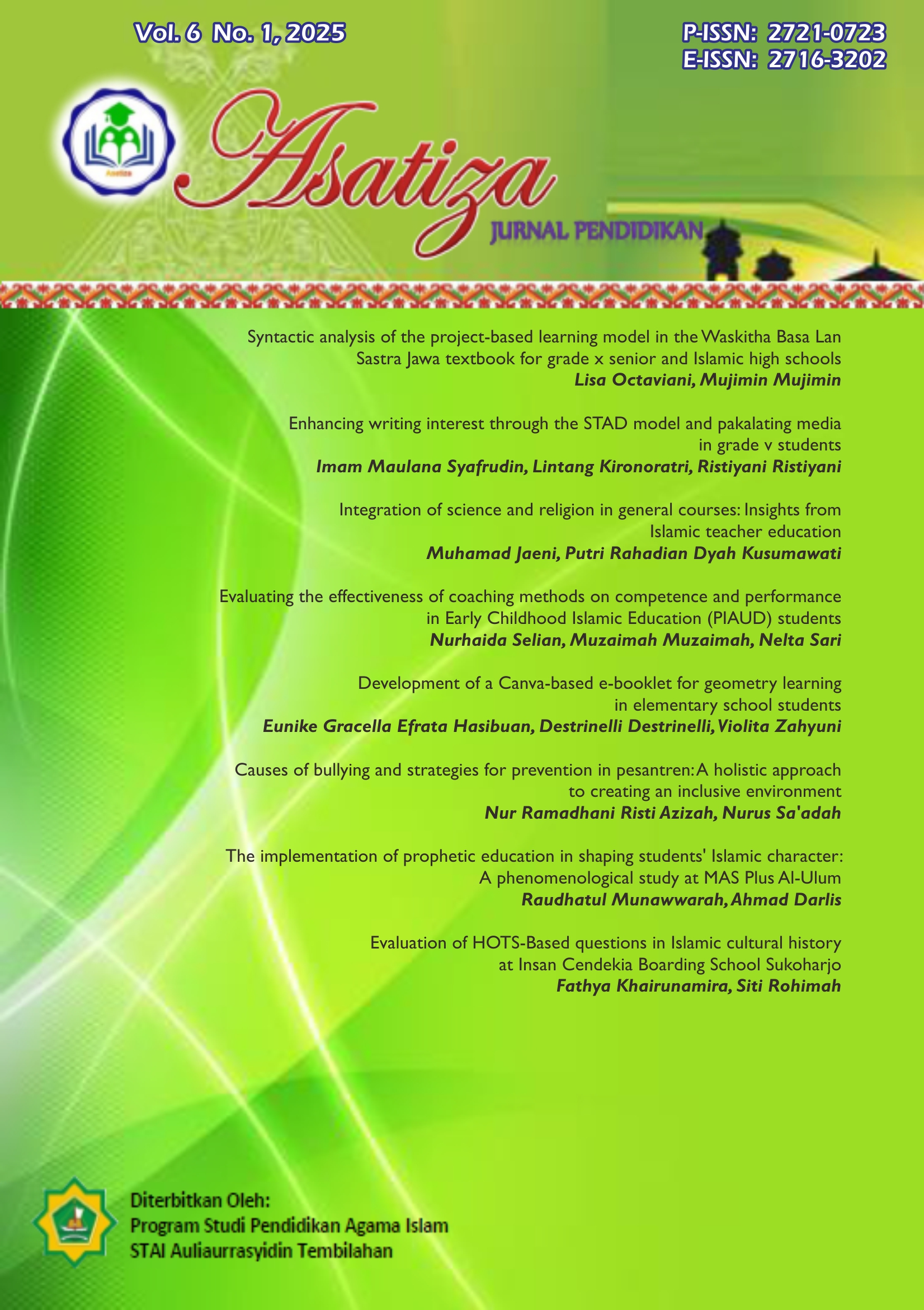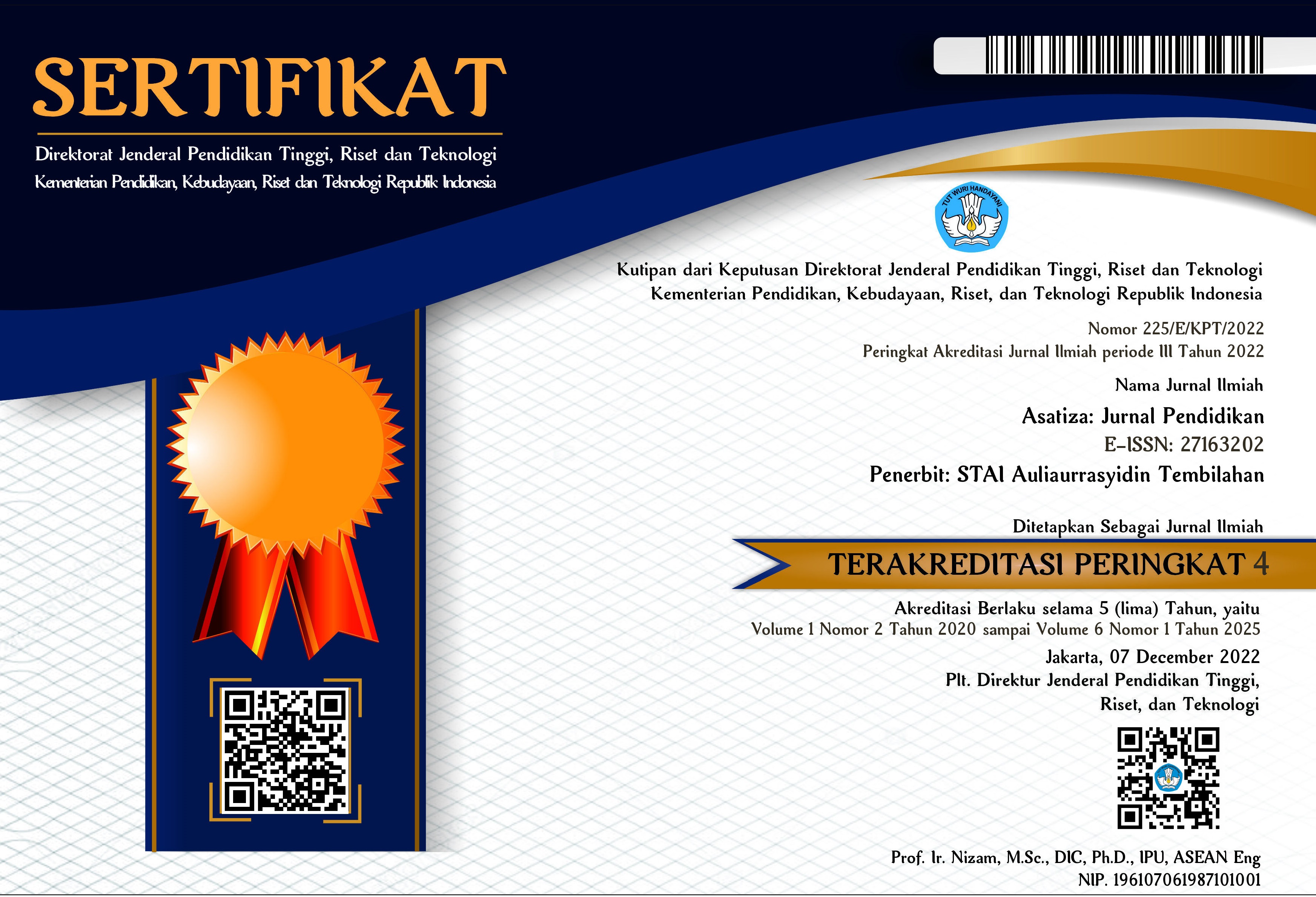Evaluating the effectiveness of coaching methods on competence and performance in Early Childhood Islamic Education (PIAUD) students
DOI:
https://doi.org/10.46963/asatiza.v6i1.2566Keywords:
Performance, Coaching Methods, Human ResourcesAbstract
This study evaluates the effectiveness of the coaching method in enhancing the competencies and performance of students in the Early Childhood Islamic Education (PIAUD) Study Program at STAIN Bengkalis. Coaching is a structured, personalized approach aimed at developing students' potential in both academic and non-academic aspects. A qualitative descriptive method was used, collecting data through interviews, observations, and document studies to explore students' experiences with the coaching process. The findings indicate that coaching positively impacts students' leadership, time management, problem-solving skills, as well as academic performance, communication, and self-confidence. Students reported greater clarity in setting goals and increased motivation. Key success factors include active student engagement, guidance from academic supervisors, and a supportive learning environment. However, challenges such as time constraints and initial confusion about the coaching process were identified. This study concludes that coaching can significantly enhance students' competencies and performance, with proper implementation in a supportive environment. It recommends the broader adoption of coaching in the PIAUD program, tailored to local contexts and needs.
Downloads
References
Ahmad, A., & Jinggan, N. (2017). Pengaruh Kompetensi Kemahiran Guru dalam Pengajaran Terhadap Pencapaian Akademik Pelajar dalam Mata Pelajaran Sejarah. JuKu: Jurnal Kurikulum & Pengajaran Asia Pasifik, 3(2), 1–11. https://spaj.ukm.my/juku/index.php/juku/article/view/120
Akhtar, S., & Zia-ur-Rehman, M. (2017). Impact of Managerial Coaching Behavior on Job Performance: Analyzing the Role of Organization Commitment and Role Clarity. Journal of Managerial Sciences, 11(3), 298–318. https://qurtuba.edu.pk/jms/default_files/JMS/special_edition/3 FMM/16 %28AIC-FMM 2017%29 297-318 Sidra Akhtar Dr. Zia 2.pdf
Aldrin, N., & Utama, A. P. (2019). Analysis of the Effect of Coaching on Teamwork Performance. International Journal of Research in Business and Social Science (2147-4478), 8(3), 24–32. https://doi.org/10.20525/ijrbs.v8i3.253
Arikunto, S. (2014). Prosedur Penelitian: Suatu Pendekatan Praktik. Rineka Cipta. https://opac.perpusnas.go.id/DetailOpac.aspx?id=426314
Asbari, M., & Prasetya, A. B. (2021). Managerial Coaching: Rahasia Membangun Kinerja, Komitmen Tim dan Modal Psikologis Guru. Edumaspul - Jurnal Pendidikan, 5(1), 490–506. https://ummaspul.e-journal.id/maspuljr/article/view/1248
Effendi, M. (2021). Pengembangan sumber daya manusia dalam meningkatkan citra lembaga di lembaga pendidikan islam. Southeast Asian Journal of Islamic Education …. https://sajiem.iainponorogo.ac.id/sajiem/article/view/40
Eldridge, S. M., Ashby, D., Feder, G. S., Rudnicka, A. R., & ... (2004). Lessons for cluster randomized trials in the twenty-first century: a systematic review of trials in primary care. Clinical …. https://doi.org/10.1191/1740774504cn006rr
Fitri, L. L., Syahidah, S., & ... (2023). Eeg Waveforms Comparison During Recalling Traumatic Events Session In Post-Flood Disaster Victims From Subang Regency. Conference on Universal. https://asasijournal.com/index.php/icuw2023/article/view/34
Grant, A. M., Green, L. S., & Rynsaardt, J. (2010). Developmental Coaching for High School Teachers: Executive Coaching Goes to School. Consulting Psychology Journal, 62(3), 151–168. https://doi.org/10.1037/a0019212
Handayani, D., Huda, N., & Cahyono, B. D. (2019). Pengaruh Metode Bimbingan Coaching Dan Motivasi Terhadap Kompetensi Rawat Luka. Jurnal Citra Keperawatan, 7(2), 79–86. https://doi.org/10.31964/jck.v7i2.122
Jacobus Wiwin. (2023). Efektivitas Metode Coaching Pada Pendampingan Kewirausahaan Guna Meningkatkan Keberhasilan Start-Up Digital Mahasiswa Pada Universitas Pgri Kanjuruhan Malang. Edu Research, 4(2), 78–87. https://doi.org/10.47827/jer.v4i2.111
Maharani, S. A., & Widiartanto, W. (2017). Pengaruh Self-Efficacy, Coaching Dan Empowerment Terhadap Kinerja Karyawan Cv. Laxita Paramitha Semarang (Studi Pada Mahasiswa S1 Universitas …. In Jurnal Ilmu Administrasi Bisnis. ejournal3.undip.ac.id. https://ejournal3.undip.ac.id/index.php/jiab/article/download/16766/16102
Neuman, W. L. (2017). Metodologi penelitian sosial: Pendekatan kualitatif dan kuantitatif. digilib.itbwigalumajang.ac.id. http://digilib.itbwigalumajang.ac.id/index.php?p=show_detail%5C&id=7963
Pebdika, A., Herdiana, R., & Solihudin, D. (2023). Klasifikasi Menggunakan Metode Naive Bayes Untuk Menentukan Calon Penerima Pip. JATI (Jurnal Mahasiswa Teknik Informatika), 7(1), 452–458. https://doi.org/10.36040/jati.v7i1.6303
Rahmah, D. D. N., & Muhliansyah, M. (2020). Pelatihan Coaching Model Grow untuk Meningkatkan Kinerja Anggota Organisasi. Plakat: Jurnal Pelayanan …. https://e-journals.unmul.ac.id/index.php/plakat/article/view/3824
Rusmini, R., Emilyani, D., & Dramawan, A. (2023). Efektivitas Model Pendekatan Manajemen Coaching Bimbingan Akademik Terhadap Indeks Prestasi Mahasiswa Jurusan Keperawatan. Jurnal Persatuan Perawat Nasional Indonesia (JPPNI), 7(1), 26. https://doi.org/10.32419/jppni.v7i1.364
Sugyono. (2016). Metode Penelitian Kuantitatif, Kualitatif, dan R&D. Alfabeta.
Zam, E. M. (2022). Efektivitas Coaching Pelatihan Kepemimpinan Administrator (PKA) Secara Dalam Jaringan (Daring) di Badan Pengembangan Sumber Daya Manusia Provinsi Riau. Jurnal Widyaiswara Indonesia. https://ejournal.iwi.or.id/ojs/index.php/iwi/article/view/126
Downloads
Published
Issue
Section
License
Copyright (c) 2025 Nurhaida Selian, Muzaimah Muzaimah, Nelta Sari

This work is licensed under a Creative Commons Attribution-ShareAlike 4.0 International License.
Authors who publish with this journal agree to the following terms:
1. Copyright on any article is retained by the author(s).
2. The author grants the journal, right of first publication with the work simultaneously licensed under a Creative Commons Attribution shareAlike 4.0 International License that allows others to share the work with an acknowledgment of the work’s authorship and initial publication in this journal.
3. Authors are able to enter into separate, additional contractual arrangements for the non-exclusive distribution of the journal’s published version of the work (e.g., post it to an institutional repository or publish it in a book), with an acknowledgment of its initial publication in this journal.
4. Authors are permitted and encouraged to post their work online (e.g., in institutional repositories or on their website) prior to and during the submission process, as it can lead to productive exchanges, as well as earlier and greater citation of published work.
5. The article and any associated published material is distributed under the Creative Commons Attribution-ShareAlike 4.0 International License











2.png)



